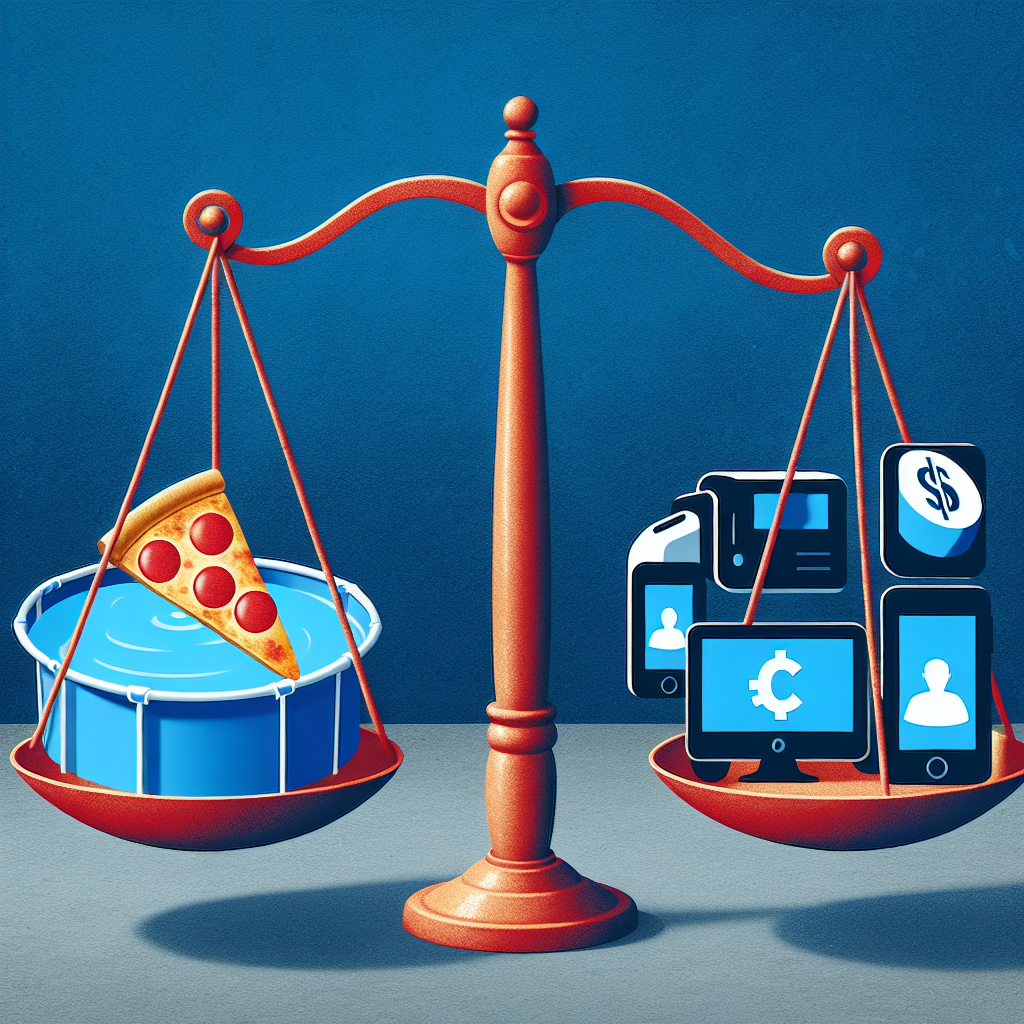“Shifting Slices: Berkshire Bets on Pizza and Pools, Trims Apple Orchard”
Introduction
Berkshire Hathaway, the multinational conglomerate led by renowned investor Warren Buffett, has recently made strategic adjustments to its investment portfolio, signaling a shift in its investment strategy. The company has increased its stakes in Domino’s Pizza and Pool Corporation, two companies that have shown robust growth potential in their respective industries. Domino’s, a leader in the global pizza delivery market, and Pool Corp, a major distributor of swimming pool supplies and related products, both represent sectors with strong consumer demand and growth prospects. Concurrently, Berkshire Hathaway has reduced its holdings in Apple Inc., a move that has garnered significant attention given Apple’s status as one of the most valuable and influential technology companies in the world. This reallocation of assets reflects Berkshire Hathaway’s ongoing efforts to optimize its investment portfolio and capitalize on emerging market opportunities.
Impact Of Berkshire Hathaway’s Investment In Domino’s On The Fast-Food Industry
Berkshire Hathaway’s recent investment in Domino’s Pizza and Pool Corporation, coupled with a reduction in its Apple holdings, has sent ripples through the fast-food industry, signaling potential shifts in market dynamics and investor sentiment. This strategic move by the investment giant, led by the venerable Warren Buffett, underscores a nuanced approach to portfolio diversification and reflects broader trends within the fast-food sector.
To begin with, Berkshire Hathaway’s decision to invest in Domino’s Pizza highlights the growing appeal of the fast-food industry, particularly in the context of evolving consumer preferences and technological advancements. Domino’s, a leader in the pizza delivery market, has consistently demonstrated its ability to adapt to changing consumer demands through innovative strategies, such as its robust digital ordering platform and efficient delivery systems. This adaptability has not only bolstered its market position but also made it an attractive investment opportunity for Berkshire Hathaway. By aligning itself with Domino’s, Berkshire Hathaway is effectively endorsing the fast-food chain’s business model, which emphasizes convenience, speed, and customer satisfaction.
Moreover, this investment could potentially influence other investors to reevaluate their positions within the fast-food industry. As Berkshire Hathaway is renowned for its astute investment choices, its endorsement of Domino’s may prompt a reassessment of the fast-food sector’s growth potential. This could lead to increased investor interest in companies that demonstrate similar innovative capabilities and market resilience. Consequently, other fast-food chains may feel compelled to enhance their technological infrastructure and delivery services to remain competitive and attract investment.
In addition to the direct impact on Domino’s, Berkshire Hathaway’s investment strategy may also have broader implications for the fast-food industry as a whole. The decision to reduce its holdings in Apple, a technology behemoth, in favor of a fast-food company suggests a shift in focus towards sectors that offer tangible growth opportunities in the current economic climate. This move could be interpreted as a signal that traditional consumer sectors, such as fast food, are poised for a resurgence, driven by factors like increased consumer spending and a renewed emphasis on convenience.
Furthermore, the investment in Domino’s aligns with a growing trend of consumer preference for delivery and takeout options, which has been accelerated by the global pandemic. As consumers continue to prioritize convenience and safety, fast-food chains that can efficiently meet these demands are likely to experience sustained growth. Berkshire Hathaway’s investment thus reinforces the notion that the fast-food industry is well-positioned to capitalize on these evolving consumer behaviors.
In conclusion, Berkshire Hathaway’s investment in Domino’s Pizza represents a strategic endorsement of the fast-food industry’s potential for growth and innovation. By choosing to invest in a company that exemplifies adaptability and customer-centric strategies, Berkshire Hathaway is not only influencing investor sentiment but also encouraging other fast-food chains to enhance their competitive edge. As the industry continues to evolve in response to changing consumer preferences, this investment serves as a testament to the enduring appeal and resilience of the fast-food sector. Through this strategic move, Berkshire Hathaway has once again demonstrated its ability to identify and capitalize on emerging market trends, thereby shaping the future landscape of the fast-food industry.
Strategic Reasons Behind Berkshire Hathaway’s Investment In Pool Corp
Berkshire Hathaway’s recent investment decisions have captured the attention of market analysts and investors alike, particularly its strategic move to invest in Pool Corporation. This decision, alongside a reduction in its Apple holdings, reflects a nuanced approach to portfolio diversification and risk management. Understanding the strategic reasons behind Berkshire Hathaway’s investment in Pool Corp requires an examination of the broader economic context and the specific attributes of the company that align with Berkshire’s investment philosophy.
To begin with, Pool Corporation, as the world’s largest wholesale distributor of swimming pool supplies, equipment, and related leisure products, presents a unique opportunity for Berkshire Hathaway. The company operates in a niche market that has shown resilience and growth potential, even amid economic fluctuations. The increasing demand for residential pools, driven by lifestyle changes and a growing emphasis on home-based leisure activities, has bolstered Pool Corp’s market position. This trend is particularly pronounced in regions with warmer climates, where pools are not just a luxury but a staple of residential living. By investing in Pool Corp, Berkshire Hathaway is tapping into a sector that benefits from both cyclical and secular growth trends.
Moreover, Pool Corp’s business model aligns well with Berkshire Hathaway’s preference for companies with strong competitive advantages and robust cash flow generation. The company’s extensive distribution network and long-standing relationships with suppliers and customers create significant barriers to entry for potential competitors. This competitive moat is further reinforced by Pool Corp’s ability to leverage economies of scale, thereby enhancing its operational efficiency and profitability. Such characteristics are highly attractive to Berkshire Hathaway, which has historically favored companies with sustainable competitive advantages.
In addition to these factors, Pool Corp’s financial health and prudent management practices resonate with Berkshire Hathaway’s investment criteria. The company has consistently demonstrated strong financial performance, characterized by steady revenue growth, healthy profit margins, and disciplined capital allocation. Its management team has shown a commitment to shareholder value through strategic acquisitions and share repurchase programs, which have contributed to enhanced earnings per share and overall shareholder returns. This alignment of management interests with those of shareholders is a key consideration for Berkshire Hathaway when evaluating potential investments.
Furthermore, the decision to invest in Pool Corp can be seen as part of Berkshire Hathaway’s broader strategy to diversify its portfolio and reduce its reliance on technology stocks, such as Apple. While Apple has been a highly successful investment for Berkshire, the reduction in its holdings suggests a desire to mitigate concentration risk and explore opportunities in other sectors. By investing in Pool Corp, Berkshire Hathaway is not only diversifying its portfolio but also positioning itself to benefit from the long-term growth prospects of the leisure and home improvement industries.
In conclusion, Berkshire Hathaway’s investment in Pool Corp is a strategic move that reflects its commitment to identifying companies with strong competitive positions, solid financial performance, and growth potential. This decision underscores the importance of diversification and risk management in maintaining a balanced investment portfolio. As Berkshire Hathaway continues to navigate the complexities of the global market, its investment in Pool Corp serves as a testament to its enduring investment principles and its ability to adapt to changing economic landscapes.
Analyzing The Reduction Of Apple Holdings By Berkshire Hathaway
Berkshire Hathaway, the multinational conglomerate led by the legendary investor Warren Buffett, has long been a bellwether for market trends and investment strategies. Recently, the company made headlines with its decision to invest in Domino’s Pizza and Pool Corporation while simultaneously reducing its holdings in Apple Inc. This strategic shift has sparked considerable interest and speculation among investors and analysts alike, prompting a closer examination of the rationale behind these moves.
To begin with, Berkshire Hathaway’s decision to reduce its stake in Apple is particularly noteworthy given the company’s historical affinity for the tech giant. Apple has been a cornerstone of Berkshire’s portfolio since 2016, and its stock has delivered substantial returns over the years. However, the decision to pare down its holdings may reflect a broader strategy of diversification and risk management. By reducing its exposure to Apple, Berkshire could be seeking to mitigate potential risks associated with the tech sector, which has experienced significant volatility in recent times. Moreover, this move may also indicate a shift in focus towards other sectors that offer promising growth opportunities.
In this context, Berkshire’s investment in Domino’s Pizza and Pool Corporation is intriguing. Domino’s, a global leader in the pizza delivery industry, has demonstrated resilience and adaptability, particularly during the COVID-19 pandemic when demand for home-delivered food surged. The company’s robust digital infrastructure and innovative marketing strategies have positioned it well for sustained growth. By investing in Domino’s, Berkshire Hathaway appears to be capitalizing on the enduring appeal of the food delivery market, which continues to expand as consumer preferences evolve.
Similarly, Pool Corporation, a leading distributor of swimming pool supplies and related products, represents another strategic addition to Berkshire’s portfolio. The company has benefited from the increased demand for home improvement and outdoor leisure activities, trends that gained momentum during the pandemic and show no signs of abating. As more homeowners invest in enhancing their outdoor spaces, Pool Corporation is poised to capture a significant share of this growing market. Berkshire’s investment in Pool Corp underscores its confidence in the long-term potential of the home improvement sector.
While these new investments are promising, it is essential to consider the broader implications of Berkshire’s reduced stake in Apple. This decision may signal a cautious approach towards the tech sector, which has been subject to regulatory scrutiny and market fluctuations. By reallocating resources to companies like Domino’s and Pool Corp, Berkshire is diversifying its portfolio and potentially hedging against sector-specific risks. Furthermore, this strategy aligns with Warren Buffett’s investment philosophy of seeking value in companies with strong fundamentals and growth prospects.
In conclusion, Berkshire Hathaway’s recent investment decisions reflect a nuanced approach to portfolio management, balancing the need for diversification with the pursuit of growth opportunities. The reduction of Apple holdings, coupled with investments in Domino’s Pizza and Pool Corporation, highlights the conglomerate’s adaptive strategy in navigating an ever-changing market landscape. As investors continue to monitor these developments, Berkshire’s moves offer valuable insights into the evolving dynamics of global investment strategies.
How Berkshire Hathaway’s Portfolio Changes Reflect Market Trends

Berkshire Hathaway, the multinational conglomerate led by the legendary investor Warren Buffett, has recently made notable adjustments to its investment portfolio, reflecting broader market trends and strategic shifts. The company has increased its stakes in Domino’s Pizza and Pool Corporation while simultaneously reducing its holdings in Apple Inc. These moves offer insights into Berkshire Hathaway’s evolving investment strategy and the underlying market dynamics influencing these decisions.
To begin with, the decision to invest in Domino’s Pizza highlights Berkshire Hathaway’s recognition of the growing demand for convenience and quick-service dining options. Domino’s, a leader in the pizza delivery industry, has consistently demonstrated resilience and adaptability, particularly during challenging economic times. The company’s robust digital infrastructure and innovative delivery solutions have positioned it well to capitalize on the increasing consumer preference for online ordering and home delivery. By investing in Domino’s, Berkshire Hathaway is aligning itself with a sector that continues to thrive amid changing consumer behaviors, driven by technological advancements and a shift towards more convenient dining experiences.
In a similar vein, Berkshire Hathaway’s investment in Pool Corporation underscores the conglomerate’s strategic focus on sectors poised for long-term growth. Pool Corp, a leading distributor of swimming pool supplies and related products, has benefited from the rising trend of home improvement and outdoor leisure activities. The pandemic-induced shift towards home-centric lifestyles has spurred increased spending on home enhancements, including swimming pools and outdoor living spaces. This trend is expected to persist as consumers continue to prioritize home-based recreation and wellness. By increasing its stake in Pool Corp, Berkshire Hathaway is tapping into a market that is not only resilient but also poised for sustained growth as homeowners invest in enhancing their living environments.
Conversely, Berkshire Hathaway’s decision to reduce its holdings in Apple Inc. may appear surprising given the tech giant’s strong market position and consistent performance. However, this move can be interpreted as a strategic rebalancing of the portfolio rather than a lack of confidence in Apple’s future prospects. Apple remains a significant part of Berkshire Hathaway’s portfolio, and the reduction in shares could be a tactical decision to diversify investments and manage risk. Moreover, the tech sector has experienced substantial growth over the past decade, and trimming positions in such high-performing stocks can be a prudent approach to lock in gains and reallocate capital to other promising opportunities.
These portfolio adjustments by Berkshire Hathaway reflect broader market trends and strategic considerations. The increased investments in Domino’s and Pool Corp indicate a focus on sectors that are benefiting from evolving consumer preferences and lifestyle changes. Meanwhile, the reduction in Apple holdings suggests a disciplined approach to portfolio management, emphasizing diversification and risk mitigation. As market conditions continue to evolve, Berkshire Hathaway’s investment decisions serve as a barometer for understanding the shifting landscape and identifying sectors with potential for growth.
In conclusion, Berkshire Hathaway’s recent portfolio changes underscore the conglomerate’s ability to adapt to market trends and strategically position itself for future opportunities. By investing in companies like Domino’s and Pool Corp, while adjusting its stake in Apple, Berkshire Hathaway demonstrates a keen awareness of the dynamic market environment and a commitment to maintaining a balanced and forward-looking investment strategy. As investors and market observers analyze these moves, they provide valuable insights into the broader economic trends shaping the investment landscape.
The Long-Term Implications Of Investing In Domino’s And Pool Corp
Berkshire Hathaway’s recent investment decisions have sparked considerable interest in the financial world, particularly its choice to invest in Domino’s Pizza and Pool Corporation while simultaneously reducing its holdings in Apple. These moves, orchestrated under the guidance of Warren Buffett, suggest a strategic shift that could have significant long-term implications for the conglomerate’s portfolio. Understanding the rationale behind these investments and their potential impact requires a closer examination of the industries involved and the broader economic context.
Domino’s Pizza, a global leader in the pizza delivery market, represents a compelling investment opportunity due to its robust business model and innovative approach to technology. The company’s emphasis on digital transformation, including its user-friendly app and efficient delivery systems, has positioned it well in an increasingly digital economy. Moreover, Domino’s has demonstrated resilience in the face of economic downturns, maintaining steady growth even during challenging times. This resilience, coupled with its global expansion strategy, makes Domino’s an attractive long-term investment for Berkshire Hathaway. By investing in Domino’s, Berkshire is likely betting on the continued growth of the fast-food industry and the increasing consumer preference for convenience and digital engagement.
In parallel, Pool Corporation, the world’s largest wholesale distributor of swimming pool supplies, equipment, and related leisure products, offers another intriguing investment avenue. The company has benefited from a surge in demand for home improvement and outdoor leisure activities, trends that have been amplified by the pandemic. As more people invest in enhancing their home environments, Pool Corp stands to gain from the sustained interest in residential pools and outdoor living spaces. Furthermore, the company’s strong distribution network and market leadership provide a solid foundation for future growth. By investing in Pool Corp, Berkshire Hathaway is likely capitalizing on the long-term trend of increased spending on home and leisure, which is expected to persist even as the pandemic’s immediate effects wane.
Conversely, the decision to reduce holdings in Apple, a company that has been a cornerstone of Berkshire’s portfolio, may seem surprising at first glance. However, this move could be interpreted as a strategic rebalancing rather than a lack of confidence in Apple’s future prospects. Apple remains a dominant player in the technology sector, with a loyal customer base and a strong ecosystem of products and services. Nevertheless, Berkshire’s decision to trim its position might reflect a desire to diversify its investments and reduce exposure to a single company, especially given the substantial appreciation of Apple’s stock in recent years.
In conclusion, Berkshire Hathaway’s investment in Domino’s Pizza and Pool Corporation, coupled with the reduction in Apple holdings, underscores a nuanced approach to portfolio management. By diversifying into industries with promising growth trajectories and reducing reliance on a single tech giant, Berkshire is positioning itself to capitalize on emerging trends while mitigating potential risks. These strategic moves highlight the importance of adaptability and foresight in investment decisions, qualities that have long been associated with Warren Buffett’s leadership. As the economic landscape continues to evolve, Berkshire Hathaway’s investments in Domino’s and Pool Corp may well prove to be prescient choices that yield substantial returns over the long term.
Warren Buffett’s Investment Philosophy: Lessons From Recent Moves
Warren Buffett, the legendary investor and chairman of Berkshire Hathaway, has long been revered for his astute investment strategies and ability to identify value in the stock market. His recent moves, which include investing in Domino’s Pizza and Pool Corporation while reducing holdings in Apple, offer valuable insights into his investment philosophy. These decisions reflect a nuanced understanding of market dynamics and a commitment to long-term value creation, principles that have consistently guided Buffett’s approach to investing.
To begin with, Buffett’s decision to invest in Domino’s Pizza underscores his belief in the enduring appeal of strong consumer brands. Domino’s, a global leader in the pizza delivery industry, has demonstrated resilience and adaptability, particularly during challenging economic times. The company’s focus on technology and innovation, such as its robust online ordering platform and efficient delivery system, aligns with Buffett’s preference for businesses with a competitive edge. By investing in Domino’s, Buffett is betting on the company’s ability to maintain its market leadership and continue delivering consistent returns to shareholders.
Similarly, Berkshire Hathaway’s investment in Pool Corporation highlights Buffett’s interest in niche markets with growth potential. Pool Corp, a leading distributor of swimming pool supplies and related products, operates in a sector that benefits from increasing consumer spending on home improvement and leisure activities. The company’s strong distribution network and customer-centric approach provide a solid foundation for future growth. Buffett’s investment in Pool Corp reflects his confidence in the company’s ability to capitalize on favorable industry trends and deliver sustainable value over the long term.
In contrast, the decision to reduce holdings in Apple may seem surprising, given the tech giant’s impressive track record and dominant market position. However, this move is consistent with Buffett’s disciplined approach to portfolio management. By trimming Berkshire Hathaway’s stake in Apple, Buffett is likely seeking to rebalance the portfolio and manage risk, ensuring that no single investment becomes disproportionately large. This action also aligns with his principle of maintaining a diversified portfolio, which helps mitigate potential losses and enhances overall stability.
Moreover, Buffett’s recent investment choices illustrate his focus on businesses with strong fundamentals and the potential for steady cash flow generation. Both Domino’s and Pool Corp possess these attributes, making them attractive additions to Berkshire Hathaway’s portfolio. This emphasis on cash flow is a hallmark of Buffett’s investment philosophy, as it provides a reliable measure of a company’s financial health and its ability to weather economic downturns.
Furthermore, Buffett’s moves serve as a reminder of the importance of patience and a long-term perspective in investing. By selecting companies with durable competitive advantages and growth prospects, Buffett demonstrates his commitment to holding investments for the long haul, allowing them to compound in value over time. This approach contrasts with the short-term mindset that often prevails in the stock market, emphasizing the value of strategic foresight and disciplined decision-making.
In conclusion, Warren Buffett’s recent investments in Domino’s Pizza and Pool Corporation, coupled with the reduction of Apple holdings, offer a window into his enduring investment philosophy. By focusing on strong consumer brands, niche markets with growth potential, and businesses with robust cash flow, Buffett continues to exemplify the principles of value investing. His actions underscore the importance of diversification, risk management, and a long-term perspective, providing valuable lessons for investors seeking to navigate the complexities of the financial markets.
Comparing The Growth Potential Of Domino’s And Pool Corp In Berkshire’s Portfolio
Berkshire Hathaway’s recent investment decisions have sparked considerable interest in the financial community, particularly its choice to invest in Domino’s Pizza and Pool Corporation while simultaneously reducing its holdings in Apple. This strategic shift invites a closer examination of the growth potential of Domino’s and Pool Corp within Berkshire’s diverse portfolio. Understanding the rationale behind these investments requires an exploration of the unique market positions and growth trajectories of these companies.
Domino’s Pizza, a global leader in the pizza delivery industry, has consistently demonstrated robust growth through its innovative use of technology and a strong focus on customer convenience. The company’s commitment to digital transformation has been a key driver of its success, with a significant portion of its sales now generated through online platforms. This digital prowess not only enhances customer experience but also streamlines operations, leading to improved efficiency and profitability. Furthermore, Domino’s has been expanding its international footprint, tapping into emerging markets where the demand for quick-service restaurants is on the rise. This global expansion strategy positions Domino’s to capitalize on new growth opportunities, making it an attractive investment for Berkshire Hathaway.
In contrast, Pool Corporation, the world’s largest wholesale distributor of swimming pool supplies, equipment, and related leisure products, offers a different kind of growth potential. The company benefits from a strong market position in a niche industry that has seen increased demand, particularly in the wake of the COVID-19 pandemic. As more people invest in home improvement and outdoor leisure activities, Pool Corp has experienced a surge in sales. The company’s extensive distribution network and comprehensive product offerings provide a competitive edge, enabling it to capture a significant share of the market. Additionally, Pool Corp’s focus on sustainability and innovation, such as energy-efficient pool equipment, aligns with broader consumer trends, further enhancing its growth prospects.
While both Domino’s and Pool Corp present compelling growth opportunities, their market dynamics and strategic approaches differ significantly. Domino’s relies heavily on technological innovation and global expansion to drive growth, whereas Pool Corp capitalizes on its dominant market position and the increasing popularity of home leisure activities. This diversification within Berkshire Hathaway’s portfolio reflects a strategic balance between technology-driven growth and stable, niche market leadership.
The decision to reduce Apple holdings, on the other hand, may be seen as a move to reallocate resources towards these emerging opportunities. Although Apple remains a highly profitable and influential company, its growth rate has naturally slowed as it matures. By diversifying into companies like Domino’s and Pool Corp, Berkshire Hathaway can potentially achieve higher returns by tapping into sectors with significant growth potential.
In conclusion, Berkshire Hathaway’s investment in Domino’s Pizza and Pool Corporation underscores a strategic shift towards companies with distinct growth trajectories and market advantages. While Domino’s leverages technology and international expansion, Pool Corp benefits from its strong market position and alignment with consumer trends. This diversification strategy not only mitigates risk but also positions Berkshire Hathaway to capitalize on emerging opportunities in the global market. As these companies continue to evolve and adapt to changing consumer preferences, their inclusion in Berkshire’s portfolio highlights the conglomerate’s forward-thinking approach to investment.
Q&A
1. **What companies did Berkshire Hathaway recently invest in?**
Berkshire Hathaway recently invested in Domino’s Pizza and Pool Corp.
2. **Which company’s holdings did Berkshire Hathaway reduce?**
Berkshire Hathaway reduced its holdings in Apple.
3. **Why is Berkshire Hathaway’s investment in Domino’s significant?**
The investment in Domino’s is significant as it marks a strategic move into the fast-food sector, which can offer stable returns and growth potential.
4. **What is Pool Corp, and why might it be an attractive investment?**
Pool Corp is a leading distributor of swimming pool supplies and related products. It might be attractive due to the growing demand for home leisure and outdoor activities.
5. **How does reducing Apple holdings align with Berkshire Hathaway’s strategy?**
Reducing Apple holdings could be part of a strategy to diversify its portfolio and manage risk, given Apple’s significant weight in Berkshire’s portfolio.
6. **What impact might these investment changes have on Berkshire Hathaway’s portfolio?**
These changes could lead to a more diversified portfolio, potentially reducing risk and increasing exposure to different sectors.
7. **How do these investment decisions reflect on Warren Buffett’s investment philosophy?**
These decisions reflect Warren Buffett’s philosophy of investing in companies with strong fundamentals and growth potential while maintaining a balanced and diversified portfolio.
Conclusion
Berkshire Hathaway’s investment in Domino’s and Pool Corp, alongside a reduction in Apple holdings, suggests a strategic diversification approach by the conglomerate. By investing in Domino’s, Berkshire is likely capitalizing on the resilience and growth potential of the fast-food industry, particularly in the pizza segment, which has shown strong performance and adaptability in various market conditions. The investment in Pool Corp indicates a bet on the continued demand for outdoor leisure and home improvement products, reflecting confidence in consumer spending in these areas. Meanwhile, the reduction in Apple holdings could be a move to rebalance the portfolio, take profits, or mitigate risk given Apple’s significant weight in Berkshire’s portfolio. Overall, these moves highlight Berkshire Hathaway’s adaptive investment strategy, focusing on sectors with promising growth prospects while managing exposure to existing large positions.





